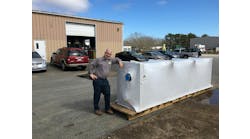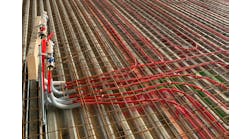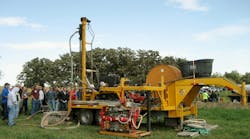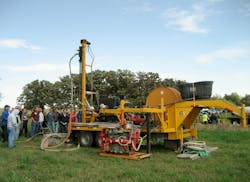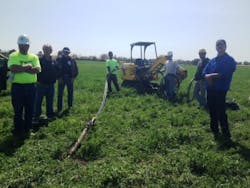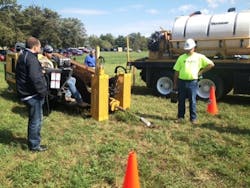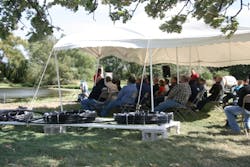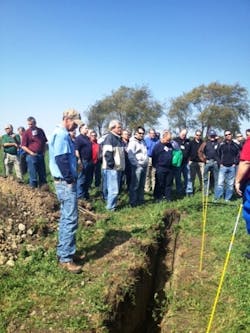The concept of ground source heat pump technology is not new at all. Actually geothermal heating and cooling has been around for decades, and currently it is gaining more momentum thanks to the manufacturers, associations and contractors that understand all of its benefits. Manufacturers and associations are also educating the industry about geothermal technology via courses, seminars and events for contractors, distributors, engineers and architects.
A bore hole is drilled and grouted as part of an installation demonstration at ClimateMaster’s most recent GeoDay.
“There still seems to be a mystery around geothermal, so if you look at the industry only about 5% are doing geothermal,” says Raj Hiremath, director of marketing for residential products at ClimateMaster. The geothermal heat pump manufacturer exhibited at Mechanical Systems Week, Sept. 19-21, in Schaumburg, Ill., and also held GeoDay on Sept. 19 in conjunction with Mechanical Systems Week.
A day in the field
ClimateMaster has been hosting several outdoor, multi-station, hands-on geothermal sales and training events nationwide — from Texas and the state of Washington to Ohio and Pennsylvania, and just recently at Mechanical Systems Week. GeoDay events have become a training arena for HVAC, geothermal and drilling contractors nationwide, with ClimateMaster professionals sharing their expertise.
“Contractors are very interested in the geothermal technology,” says Hiremath. “At the event we had 150 people signed up.”
The first half of GeoDay at Mechanical Systems Week was onsite at the Schaumburg Convention Center. This portion of the event was held in a seminar room and covered the basics of geothermal systems and selling using ROI; the different type of loops and their advantages; product overviews; and a review of ClimateMaster’s GeoDesigner software.
The second-half of the day was at Serosun Farms in Hampshire, Ill. Contractors were able to see firsthand the different types of loop installations.
Horizontal boring leaves a small penetration in soil at the entrance and exit points.
Along with ClimateMaster, Connor Co. headquartered in Peoria, Ill., was onsite at Serosun Farms to demonstrate the three main ways to install piping: vertical loop, horizontal boring and horizontal backhoe loop. Pond loop installation was also demonstrated along with unit start up and commissioning.
According to Richard Hiles, district manager of residential products at ClimateMaster, the horizontal boring is usually used on replacement projects where less landscaping "repair" is desired and where land space is limited. Vertical loops are used when there is not a lot of land to work with, and horizontal loops are used when there is a decent amount of land.
“With horizontal trenches the customer usually needs to replant grass, etc., and the boring only has the small entrance and exit points,” says Hiles.
The horizontal boring demonstration.
According to Joe Fish, ClimateMaster’s district manager of residential products, pond loops are typically less expensive than vertical loops.
“If you have a pond on your property and it is ¼ of an acre in surface area and about 7-ft. to 8-ft. deep you are able to use it as a source of energy for geothermal,” explains Fish. “Vertical loops are installed using man power, half million dollar drill rigs and can be time consuming depending on what they drill through. Typically on vertical commercial jobs they drill anywhere from 300-ft. to 450-ft. Typically they can do two to four holes a day (depending on what they drill through and how deep). For commercial pond loops you don’t have that drill rig! You’re just digging from building to pond.”
Sean Hogan, technical trainer at ClimateMaster, explains the specifics of a pond loop installation to attendees.
Brad Popejoy, branch manager of Bill's HVAC, Geothermal, & Plumbing, Moline, Ill., attended GeoDay. Popejoy is very familiar with geothermal technology — Bill's HVAC, Geothermal, & Plumbing has installed approximately 800 units by most manufacturers.
Popejoy points out that the beautiful part of geothermal technology is once the loops are in the ground they can be reused on future systems, which saves on future costs.
“Also, homes for sale with geothermal heating and cooling are more desirable than homes for sale without because of the proven low utility costs to operate,” says Popejoy. “Other advantages of geothermal include free hot water, increased air purification, no uncomfortable temperature swings, etc., etc.”
A horizontal application is also demonstrated at GeoDay.
As most reputable contractors know, installation is the key to a properly working system.
“We design all our systems in-house and use a loop contractor specific to geothermal,” says Popejoy. “These two components are the most critical as far as I am concerned. You can take the best system in the world and install it improperly and it will not work like it should.”
Both Fish and Hiles think GeoDay at Mechanical Systems Week was a success.
“We had roughly 150 people there, which was a lot for the event for the first time in that region,” says Fish. “We hope that we take some fear out of doing geothermal. Having them touch it and see it should make things clearer and answer some of their questions and hopefully get them to start doing geo. One of the great things about this type of outdoor training is that nearly every possible means of geothermal exchange is demonstrated.”
“We had a good group of people at the site,” saysHiles. “We hope they gain a better understanding of different loop technologies available to them. Many HVAC dealers sub the loop portion out to a dedicated loop contractor. We want them to be able to talk to end users about the different loops and help to determine the best one for that site. The loop that goes in for the lowest upfront costs is the best selection when considering payback or ROI.”
Manufacturers offer training
In addition to ClimateMaster, Enertech, WaterFurnace and Modine were showcasing products in the exhibit hall at Mechanical Systems Week.
At the Enertech booth, GeoComfort, Hydron Module and TETCO products were displayed. All three brands are made in Mitchell, S.D. The company offers training for service, installation, sales, application and design through its Geothermal University. The International Ground Source Heat Pump Association (IGSHPA) certification and NATE continued education hours are incorporated into the curriculum with specific design and sales courses for Enertech's brands.
“Training is so important; I can’t expand upon it enough,” says Steve Smith, president and CEO of Enertech. “We wanted to put more emphasis on it, so we came out with in-depth, repetitive training, so that is where the Geothermal University came from.”
The headquarters in Greenville, Ill., has a training facility and some training is done in Mitchell, S.D., but about 80% of customer training, however, is done offsite. Enertech staff goes to where the customers are located.
“The training has been ongoing since the company was opened,” says Smith. “I’ve been doing training since 1987. Those of us who have been in the industry for a while really believe in it and it’s a never-ending goal and objective of ours.
“The one thing is there are a lot of contractor owners that think training is a necessary evil,” says Smith. “It’s hard to put into words how important training is because what that employee learns is efficiency in the installation, service and troubleshooting. More importantly is they know how to do it right the first time, so there are no call backs. It’s important to make them understand that employees should be sent back to training every couple of years so they don’t become complacent. That is why continuing education is important. It’s worthwhile to let employees go to training for a few days.”
WaterFurnace also offers classes on geothermal equipment, including service and installation, geothermal piping design, hydronics applications and introduction to geothermal HVAC systems.
“We offer one day classes to dealers where we send a trainer to their shop to train service technicians and we also have a course designed to help a dealer transition from residential to commercial,” says Sonny Hampton, director of training at WaterFurnace. “We also do custom classes.”
WaterFurnace offers training at its factory in Fort Wayne, Ind., however, the company’s classes are designed to be offsite, so WaterFurnace trainers go to where dealers are located.
“We do eight to10 classes in service and installation a year and two pipe and design classes a year at the facility, but our classes are made to be portable,” says Hampton. “We typically have four to five classes going on every week.”
At the moment, five WaterFurnace trainers are traveling the country to train contractors on how to properly install and service the The WaterFurnace 7 Series, a new product that was launched earlier this year.
“We did a series of about 22 classes this summer that were part of the new product launch, and I was surprisingly impressed that we had 12-50 people in each class,” says Sonny Hampton. “We just started our new training season and our numbers are probably 25-26 people on average.”
Modine Manufacturing Co. also exhibited geothermal equipment at Mechanical Systems Week. Recently the company acquired Geofinity Manufacturing of Surrey, British Columbia. This acquisition provides Modine with a full line of geothermal heat pumps in both water-to-water and water-to-air models. Geofinity extends Modine’s current geothermal heat pump product range beyond school-only applications to a wider market, one that has grown at a rate of nearly 15% annually. With a focus on the residential market, Geofinity offers Modine an excellent opportunity to expand Modine’s distributed-product offerings to an established customer base.
Modine trains distributors on their products, and average classes are 10 to 12 people. Some of the training is also customized for the distributors.
Modine also plans to work with Gateway Technical College, Racine, Wis., to create a program for Modine’s customer base.
“We are in discussions with them on what type of program we would like to develop and the framework for our collaboration,” says Matt McBurney, vice president of the Commercial Products Group at Modine. “They already have a geo-exchange program, so it would be some derivation of that tailored for our and our customer’s needs.”
Bosch also offers training for its geothermal products. Courses offered include Geothermal Bits & Pieces training, Advanced Geothermal Troubleshooting training, and IGSHPA Accredited Installer Workshop. Detailed information on the courses can be found at: https://dealers.bosch-climate.us/bosch-training/.
A growing technology
The International Ground Source Heat Pump Association (IGSHPA), headquartered on the campus of Oklahoma State University, Stillwater, Okla., promotes the use of ground source heat pump technology worldwide. Established in 1987, the association is a non-profit, member-driven organization, advancing ground-source heat pump (GSHP) technology on local, state, national and international levels. IGSHPA utilizes state-of-the-art facilities for conducting GSHP system installation training and geothermal research. Starting in 1987, IGSHPA has hosted 24 annual conferences, and the 25th conference is this October in Indianapolis.
IGSHPA offers courses for a variety of professionals involved in the geothermal industry, including contractors, engineers, GSHP developers, architects, manufacturers, distributors, dealers and installers.
“We have a state-of-the-art training facility at our headquarters in Stillwater, Okla.,” says Roshan Revankar, training program manager at IGSHPA. “All three of our major courses are taught here, and we also train experienced personnel in GSHP applications to teach our courses around the globe. Research has been an integral part in the development of ground source, with Oklahoma State being one the pioneer institutions in the nation.”
For contractors, IGSHPA offers an Accredited Installer Workshop. Detailed information about the course can be found at: http://www.igshpa.okstate.edu/training/accredited.htm.
“In this course a contractor learns the entire procedure and standards required to install a ground loop and also the technicalities and difficulties from experienced industry guys that go into doing this procedure,” says Revankar.
The Geothermal Exchange Organization (GEO), a non-profit trade association that provides education and advocacy for the geothermal heat pump industry has strong alliances with industry associations, including IGSHPA. At Mechanical Systems Week Doug Dougherty, president of GEO, spoke to attendees about the status of the geothermal heat pump industry.
According to Dougherty, more than 2 million geothermal heat pumps have been installed in the U.S. and Canada, and U.S. geothermal installations have doubled in the past decade. Dougherty also points out that with favorable incentives and new strides in efficiencies the industry is poised to explode when the U.S. economy rebounds.
“Anyone in the HVAC contracting business can easily adapt to this technology,” says Dougherty. “A lot of HVAC companies are adding geothermal to their portfolio. Everyone now understands that this is a growing technology. Also, we are beginning to see geothermal at community college levels. More and more are offering it as a part of a green technology curriculum.”
